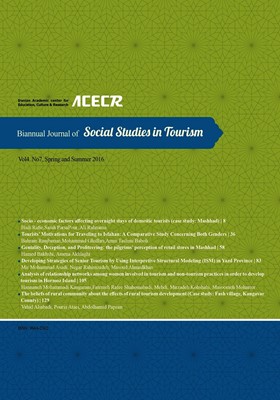Geniality, Deception, and Profiteering: the pilgrims’ perception of retail stores in Mashhad
Subject Areas :
1 - پژوهشکده گردشگری جهاد دانشگاهی مشهد
2 -
Keywords: Retail service quality Pilgrim Salespersons of retail stores Mashhad Tourist shopping experience,
Abstract :
Mashhad is one of the largest religious tourism markets in Iran and in the Muslim world. Sustainable development of this market is dependent on mutual satisfaction of service providers and tourists as customers. One of the important sectors of tourism services is shopping and souvenirs, which is mainly provided by retailers. Therefore, this paper tries to identify the tourists’ perceptions of these retailers in Mashhad. In the field of customer satisfaction, customer perception of service provider- customer interaction, is one of the dimensions of service qualities which determine tourists’ shopping experience. For data collection, a random number of 410 pilgrims who have visited the holy shrine of Imam Reza were asked to describe retailers in Mashhad. Collected data was analyzed by quantitative and qualitative content analysis method, pilgrims’ answers were categorized and then the frequency of each category was calculated. The results revealed that three categories of Profiteering, Deception, and Geniality, respectively include 40.7, 36.3, and 27.1 percent of the responses, which are the highest frequencies among the traits attributed to retailers. This could mean that pilgrims’ image of retailers is a person who uses deception and geniality strategies for his profiteering goals. It seems that temporal characteristic of tourist-buyers, as well as tourists’ insists for discounting, lead retailers to "flexible deception" strategies which more guarantee their interests.
اسکافی، مریم. (۱۳۸۳). «بررسی ارتباط کسبه، هتلداران و رانندگان تاکسی با زائران امام رضا(ع) و نحوۀ ارتقای این ارتباط». گزارش طرح پژوهشی. پژوهشکده گردشگری جهاد دانشگاهی مشهد.
بخشی، حامد. (۱۳۹۰). «بررسی نگرش زائران به مردم و خدمات رسانان در شهر مشهد». گزارش طرح پژوهشی. پژوهشکده گردشگری جهاد دانشگاهی مشهد.
حقیقی نسب، منیژه؛ یزدانی، حمیدرضا؛ کریمی، انسیه. (۱۳۹۳). «بررسی عوامل مؤثر بر رضایت گردشگران خارجی و نتایج آن و سنجش رضایت آنان از خدمات گردشگری در شهر اصفهان». مدیریت بازرگانی. دوره ۶. شماره ۴. صص ۷۳۱-۷۵۳.
سقایی، مهدی؛ جوانبخت قهفرخی، زهره؛ مافی، عزتالله. (۱۳۹۱). «تحلیل نقش مراکز خرید در رابطه با گردشگری و زیارت در کلانشهرها؛ مطالعه موردی: کلانشهر مشهد». مجله مطالعات جغرافیایی مناطق خشک. سال دوم. شماره ۸. صص ۷۰-۱۰۱.
سلیمانی، منصور؛ محمدنژاد، علی؛ خدادادی، پروین؛ عطایی، وحید. (۱۳۹۴). «سنجش رضایتمندی گردشگران از شهر مهاباد با تأکید بر گردشگری خرید». اقتصاد و مدیریت شهری. سال سوم. شماره ۱۰. صص ۱۳۹-۱۵۵.
مافی، عزتالله؛ سقایی، مهدی. (۱۳۸۹). «نگاهی به اقتصاد گردشگری در کلانشهرها؛ مطالعۀ موردی: کلانشهر مشهد». مجلۀ جغرافیا و توسعه ناحیهای. سال 8. شماره 15. صص۲۶۷-۲۹۲.
نجارزاده، محمدامین؛ بیدختی، علیاکبر؛ مرادنژاد، جمال. (۱۳۹۴). «ارزیابی عوامل مؤثر بر رضایتمندی کلی گردشگران خرید در شهر مرزی شهر بانه». نشریه تحقیقات کاربردی علوم جغرافیایی. سال ۱۵. شماره ۳۶. صص ۹۷-۱۱۵.
Barutçu, S., Doğan, H., &Üngüren, E. (2011). Tourists’ Perception and Satisfaction of Shopping in Alanya Region: A Comparative Analysis of Different Nationalities. Procedia-Social and Behavioral Sciences, 24, 1049-1059.
Becser, N.(2007) Improving service quality in retialtrad- The premises of apotential measurement model and a decision support system based on it-, P.H.D Thesis: Convinus university of Budapest.
Chang, J., Yang, B. T., & Yu, C. G. (2006). The moderating effect of salespersons’ selling behaviour on shopping motivation and satisfaction: Taiwan tourists in China. Tourism Management, 27(5), 934-942.
Devi, P. P., &Sellappan, R. (2009). Service Quality at Retail Stores-Customers’ Perception. JK Journal of Management & Technology, 1(1), 41-52.
Karthikeyan, K., Kathiravan, M., Murali, R., &Bharath, S.(2012) DETERMINATION AND VALIDATION OF RETAIL SERVICE QUALITY INDEX (RSQI) IN APPAREL STORES IN MADURAI CITY. TECNIAJournal of Management Studies, 13, Vol. 7 No. 1, April 2012 – September 2012.
Kimani, S. W., Kagira, E. K., Kendi, L., &Wawire, C. M. (2012). Shoppers perception of retail service quality: supermarkets versus small convenience shops (Dukas) in Kenya. Journal of Management and Strategy, 3(1), p55.
Maunier, C., &Camelis, C. (2013). Toward an identification of elements contributing to satisfaction with the tourism experience. Journal of Vacation Marketing, 19(1), 19-39.
Moscardo, G. (2004). Shopping as a destination attraction: An empirical examination of the role of shopping in tourists’ destination choice and experience. Journal of Vacation Marketing, 10(4), 294-307.
Nadiri, H., &Tümer, M. (2009). Retail service quality and behavioural intentions: an empirical application of the retail service quality scale in Northern Cyprus. E+ M Ekonomie a Management, 127-38.
Oliver, R. (2015). Satisfaction: a behavioral perspective on the consumer. New York: Taylor & Francis.
Tosun, C., Temizkan, S. P., Timothy, D. J., &Fyall, A. (2007). Tourist shopping experiences and satisfaction. International Journal of Tourism Research, 9(2), 87-102.
Turner, L. W., &Reisinger, Y. (2001). Shopping satisfaction for domestic tourists. Journal of Retailing and Consumer Services, 8(1), 15-27.
Wong, I. A., & Wan, Y. K. P. (2013). A Systematic Approach to Scale Development in Tourist Shopping Satisfaction Linking Destination Attributes and Shopping Experience. Journal of Travel Research, 52(1), 29-41.
Wong, J., & Law, R. (2003). Difference in shopping satisfaction levels: a study of tourists in Hong Kong. Tourism Management, 24(4), 401-410.
Yuksel, A. (2004). Shopping experience evaluation: a case of domestic and international visitors. Tourism Management, 25(6), 751-759.
.


